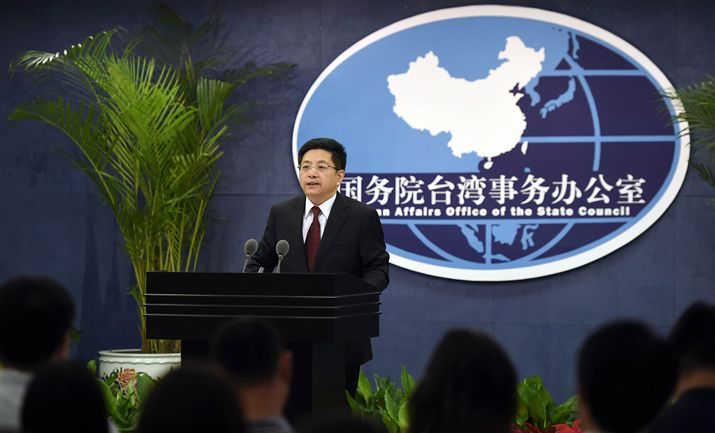Increasing uncertainty
- By Yin Cunyi
 0 Comment(s)
0 Comment(s) Print
Print E-mail China.org.cn, June 1, 2016
E-mail China.org.cn, June 1, 2016
|
|
|
Ma Xiaoguang, spokesman of the Taiwan Affairs Office of the State Council, speaks at a press conference in Beijing on May 25. [Xinhua photo] |
Taiwan's new leader Tsai Ing-wen took office in Taipei on May 20. Following the change of leadership in Taiwan, the most important question now is whether the ruling Democratic Progressive Party (DPP) will acknowledge the 1992 Consensus and its core implications, because the question involves the political foundation for peaceful development of cross-Straits relations. It also matters for the benefit of Chinese people on both sides of the Taiwan Straits as well as for regional stability and peace.
To most people's disappointment, Tsai posed an ambiguous stance on the 1992 Consensus in her inaugural address, not showing responsibility for history. Tsai's equivocation casts a huge shadow over the future of cross-Straits relations.
The 1992 Consensus, the common political foundation reached by the Chinese mainland and Taiwan, states that both sides of the Taiwan Straits uphold the one-China principle.
Tsai's political trick
Tsai had years ago expressed her secessionist views while she worked as a high-ranking official in cross-Straits affairs in both the administrations of Lee Teng-hui (1996-2000) and Chen Shui-bian (2000-08).
Tsai participated in research work for Lee's cross-Straits policy, in which Lee claimed that relations between the mainland and Taiwan are special relations between states.
In 2000, Chen and the DPP for the first time beat the Kuomintang and took over the leadership of Taiwan. Tsai was appointed the first DPP chairperson of the mainland affairs authority. At a press conference, Tsai publicly denied that the DPP acknowledged the 1992 Consensus.
In 2011, Tsai tried to replace the 1992 Consensus with the so-called "Taiwan consensus" in her 10-year political program that she prepared for the election campaign the next year as the DPP candidate. However, Tsai could not deny the existence of the 1992 talks but still denied the 1992 Consensus during a televised debate between candidates.
In 2015, Tsai participated in the election campaign for the second time. She learned from the past experiences and took an ambiguous stance on cross-Straits relations. In her campaign remarks, Tsai acknowledged that both sides of the Taiwan Straits reached some consensus and mutual understanding at a meeting in 1992. But she stressed that the cross-Straits relations should "maintain the present status" under the conditions of respecting the "current constitutional framework," "democratic principles" and "the will of the people in Taiwan."
In this way, Tsai deliberately avoided mentioning the core meaning of the 1992 Consensus—that both the mainland and Taiwan are part of China.
Tsai's equivocation is not only a trick of words. In fact, the DPP still insists on the proposition of separating Taiwan from China, according to the party's constitution. Moreover, the DPP has not established a relationship of mutual trust with the mainland. Therefore, it is reasonable for the mainland to urge Tsai to make clear her attitude toward the 1992 Consensus.
In her inaugural remarks, Tsai said both sides of the Taiwan Straits should "seek common points while putting aside differences." According to her, the two sides should suspend the argument over the 1992 Consensus and maintain the progress they have achieved in the last eight years. That is to say, Tsai wants to maintain the relationship with the mainland without acknowledging the 1992 Consensus.
The mainland stresses that both sides of the Taiwan Straits must abide strictly by the principle that both the mainland and Taiwan belong to China, which is a political premise for developing cross-Straits relations. This is also a common point for people across the straits. In whatever terms, either historical or according to present circumstances, cross-Straits relations are not a relationship between two states. The 1992 Consensus is not only the political cornerstone of cross-Straits relations but also an indispensable condition for the mainland and Taiwan to put aside their differences. It is the bottom line for developing cross-Straits relations.
Without acknowledging the 1992 Consensus, Tsai's attempt to maintain the current breakaway status of Taiwan and legitimize the party's separation proposition is totally wishful thinking.






